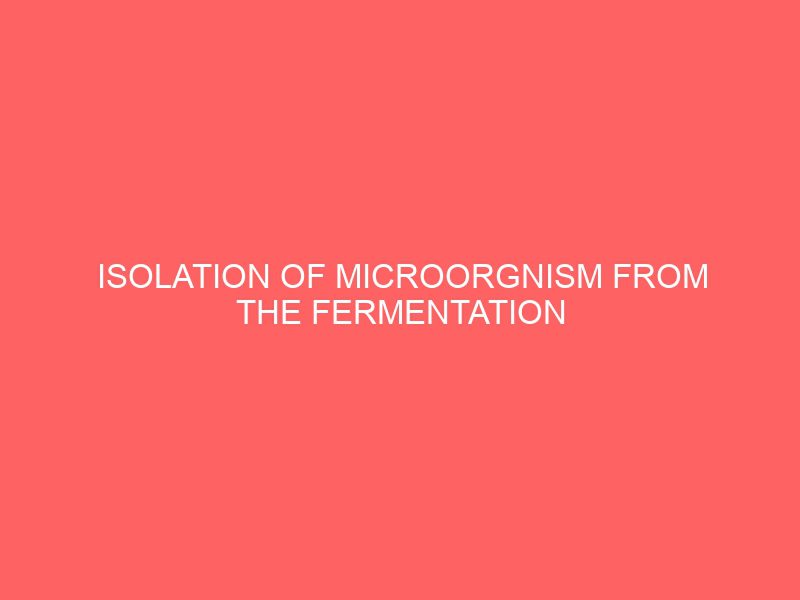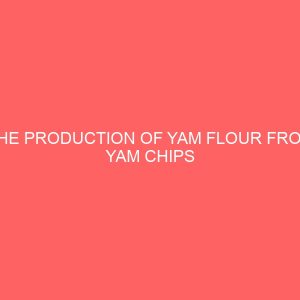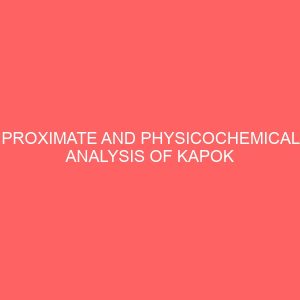Description
1.0 INTRODUCTION
Ugba also called ukpaka is a popular food delicacy in Nigeria especially among Ibo ethnic group. It is rich in protein and is obtained by a solid state fermentation of the seed of African oil bean tree Pentaclethra macrophylla Benth. It is essential food item from various traditional ceremonies where it is mixed with slices of boiled stock fish ugba and okpoloko. The natural fermentation of the seed which at present is still done at the household level, renders the production nutritious, palatable and nontoxic Enujiugha, 2002.
Its production, like many African fermented foods depends, entirely on mixed fermentation by microorganism from diverse source.
Some of these seeds have been exploited as soup bases such as Gbegiri from Vigna unguicuata Akanbi, 1992. Others are fermented and used as condiments and seasonings such as okpei from Prosopis africana Achi, 1992 and ogiri from Ricinus cummunis Odunka, 1989. Another of such seeds is the African oil bean seed Pentaclethra macrophylla Benth, a highly nutritious leguminous crop seed abundant in the rain forest areas of west and central Africa.
Pentaclethra macrophylla Benth is a large woody plant abundant in the rain forest areas of west and central Africa. Its origin in Nigeria is believed to be around 1937 Ladipo, 1984; where it is found in the South Nigeria, Mbajunwa et al, 1998.
Ugba Pentaclethra macrophylla Benth belongs to the Family Leguminosae and subfamily microsoideae Keay, 1989 and NFTA, 1995.
Ugba seeds are irregular and oval, they are flat, black and hard pods. It is composed of oil, protein and small amounts of carbohydrate Obeta, 1982.
Production of Ugba is still on age old traditional family in the rural area. The fermentation depends on random inoculation of boiled slices of the oil bean seed by microorganism within he immediate environment. Earlier report attribute the sources of the microorganism to the leaves used in packaging, human handling, container and utensils used in processing Obeta, 1993, Odunfa amp; Oyeyiola, 1985.
A number of researches have been carried out to know what causes this fermentation, and was attributed to microorganisms that are probably introduced through the air, water, and banana leaves. Organisms such as Micrococus roseus, Micrococcus luteus, Leuconostoc mesenteroides, Staphylococcus aureus, Staphylococcus epidermidis, Bacillus substilis, Bacillus megaterium and Bacillus circclans, EColi
Fermented African oil bean seed ugba, has a high rate of susceptibility to microbial spoilage and therefore has a very short self life of 12 weeks Enujiugha amp; Olajundoye, 2001.
Manifestation of food spoilage are many and vary typically resulting in an off smell, colour, taste and texture.
Reports by Mbajunwa 1998 Obeta, 1983 and Nwagu et al. 2010 indicates that micrococcus species do not play an active role during microbial fermentation of Ugba.
However, further work on spoilage association of ugba by Nwagu et al 2010 showed that the population of Micrococcus sp increased with increase in keeping time of ugba. This indicates the ability of micrococcus to thrive in the alkalophilic environment while constituting as a spoilage organism of ugba. This may be attributed to the ability of microorganism to produce lipase, lipase, or protease able to utilize protein, carbohydrate or lipid content of ugba as source of nutrition Njoku et al., 1990.
Lipase are defined as glycerol ester hydrolases EC3.1.1.3 hydrolyzing tridi and monoglycerides present at oilwater interface Saxena et al, 1999. Some lipases are also able to catalyze esterification, transesterification and enantioselective hydrolysis reaction Nine et al, 2001, Shintre et al, 2002. The interest in microbial lipase production has increased in the last decades, because of its large potential in a wide range of industrial applications and additives in food processing flavour modification.
1.1 Aims and Objectives
This work is aimed at the following;
a. isolating micrococcus from fermented ugba
b. producing lipase from the micrococcus from ugba








Reviews
There are no reviews yet.